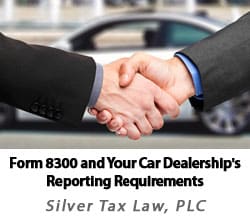Avoiding Unintentional Structuring of Cash Transactions Structuring is a strategy used by businesses that are…

What does cash mean. Cash is money, i.e., currency and coins of the United States and any other country. Cash also includes certain monetary instruments, e.g. cashier’s check, bank draft, traveler’s check or money order, but only if the face amount is $10,000 or less and the dealership receives it in designated reporting transaction (sale of a vehicle or services) or any transaction in which the dealership knows the payer is trying to avoid the reporting of the transaction on Form 8300. A personal check is not cash nor is a bank wire.
A related transaction is any transaction between a buyer and a seller that occurs within a 24-hour period or if more than 24 hours apart, if the recipient of the cash knows, or has reason to know, that each transaction is one or a series of connected transactions. As such, cash payments of less than $10,000 received over a several month period of time for connected transactions is reportable on Form 8300.
If you are required to file a Form 8300, it must be filed with FinCen within 15 days after the date the cash was received when the total exceeds $10,000. After you file the Form 8300, you must notify your customer, in writing, by January 31 of the subsequent calendar year that you filed a Form 8300. It is advisable to send the Form 8300 and notice to FinCen and the customer, respectively, by certified mail return receipt requested and regular mail. The customer must be notified of the name and address of the person completing the Form 8300, the aggregate amount of reportable cash in all related cash transactions and that the information contained in the Form 8300 is being reported to the IRS. If the dealer fails to obtain a social security number, the Form 8300 should still be filed with a statement explaining why the social security number was not included. If the customer does not have a social security number, use the IRS Individual Taxpayer Identification Number (“ITIN”). If there is no ITIN, put “NON” on the Form 8300. A Form 8300 also applies to wholesalers.
For the buy here pay here lots, if you receive cash over $10,000 over a rolling 12 month period, a Form 8300 must also be filed.
If a customer asks whether you are going to file a Form 8300, inform the customer of the law requiring the filing of the Form 8300. However, be careful about aiding a customer in structuring a transaction that would avoid the filing of a Form 8300. That topic is for another article. Remember, if the Form 8300 is filed because of suspicious activity, you cannot inform the customer of the filing.
https://www.youtube.com/watch?v=lKRQK2hn6b0When in doubt, contact either the IRS or a competent Phoenix tax professional who has expertise in this area of the law to advise you on the filing of a Form 8300. Failure to comply with the Form 8300 requirements can result in possible criminal and civil sanctions.
This article is meant only as a primer and is not all inclusive. For more information, review Form 8300 and the Instructions, IRS Publication 1544 and 31 USC Section 5331.
Published By:
7033 East Greenway Parkway, Suite 200
Scottsdale, Arizona 85254
Office: (480) 429-3360
Website: https://www.taxcontroversy.com
How Do I Handle a Criminal Tax Investigation By The IRS? Paying taxes is a…
Recent Injunctions Updates To Beneficial Ownership Reporting Requirements Breaking Down The Latest Changes To BOI…
What Should I Do If I Disagree With The Outcome Of An IRS Audit? Learn…
4 Tax Schemes From The IRS's "Dirty Dozen" List That Can Get The Average Taxpayer…